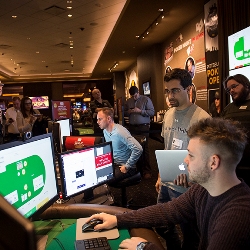Implications of AI Victory over Poker Pros

You don’t often see poker covered in the mainstream news, but a recent story has found its way onto the pages of newspapers and media outlets across the globe. From January 11th to 31st, a poker robot called Libratus faced off against four top professional poker players over 120,000 hands of heads-up no-limit hold ‘em, the outcome of which is that it managed to beat them all by a significant margin.
The Carnegie Mellon University’s designed AI program marks the first time such a piece of software has been able to out think real life seasoned players. While it’s good news for the researchers who have worked hard at its development, many poker fans are worried about what this means for the future of the game.
AI Wins by $1,766,250
The 20 day contest promoted under the title “Brains vs Artificial Intelligence” took place at the Rivers Casino in Pittsburgh, and while only virtual money was used during the game, Libratus still managed to trounce the four pros by $1,766,250. During the challenge, members of Team Human even expressed the frustration they felt at being beaten consistently by such an adept machine, especially as in their real careers they are rarely handed such a comprehensive beating by their opponents, and certainly not on an ongoing day-by-day basis. Commenting on Libratus’ style of play, one of the pros involved, Jimmy Chou, stated at the time:
“The bot gets better and better every day. It’s like a tougher version of us. The first couple of days, we had high hopes. But every time we find a weakness, it learns from us and the weakness disappears the next day.”
Real World Applications
In the meantime, Noam Brown, who helped create Libratus, hailed the AI’s success as a revolutionary milestone potential with real world applications, including in the areas of business, military, cybersecurity and medicine. As far as the game of poker is concerned, Brown explained:
“People have this idea that poker is a very human game and that bots can’t bluff, for example. That’s totally wrong. It’s not about reading your opponent and trying to tell if they are lying, it’s about the cards and probabilities.”
Solved Game Concerns
Poker fans, on the other hand, are worried that the card game has now been solved, much like chess and other games have been done in the past. If this was the case, it’s conceivable that unscrupulous individuals will one day be able to develop even more sophisticated bots than the ones that have already managed to slip past the security systems of online poker sites, and then use them to plough through their human opponents. Furthermore, it would also be very difficult for players to know if they were facing off against a cheating bot, or another real life person.
Difficult Program to Reproduce
Those concerned about the robot’s victory should first keep in mind that it took the best and brightest minds in robotics 12 years to perfect the Artificial Intelligence that recently made all the headlines. Although it did take only 18 months for the latest version to be ready form action, the researchers at Carnegie Mellon had been working from a solid foundation of research. It would therefore be very difficult for anyone to replicate the advanced technology in the near future.
Multi-Player Games Different Matter
Another fact that should give worried players peace of mind is that the computer in question was not built to handle all types of games. At this point, it is only skilled at heads-up poker, and as is well known, the rise of poker bots that are not nearly as smart as the one that bested the pros have already sent players abandoning online heads-up games.
Therefore, in order to avoid getting bested by a bot, players can simply stick to full ring and six-max games, as bots need to be very advanced to win in these kind of settings. In addition, a lot of money needs to be invested in developing artificial intelligence smart enough to anticipate the moves of multiple players. This makes it less than financially feasible for anyone but scientific researchers with grants totaling millions of dollars to work on developing them.
Mixed games are another way to avoid bots, and as the format grows in popularity, more and more games are being added to line ups, making it near impossible for unscrupulous individuals to turn a profit updating code continuously in order to get a competitive edge.
Online Poker Still Safe
All in all, while the headline news does remind us all that we need to be wary of bots, Carnegie Mellon’s poker-playing AI program is unlikely to bring about the end of online poker. As players learn what they can do to protect themselves, online operators are also realizing that they need to up their game to ensure that everyone who takes to their virtual tables is “Naturally Intelligent.”










